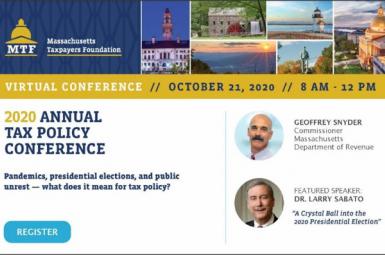This report is the second in a three-part series on the implications of telework for the Commonwealth of Massachusetts. MTF’s initial report provided an overview of the current policy landscape as it pertains to telework. This report will explore how the location of an employee can impact Massachusetts’s jurisdiction to impose various taxes and what the fiscal impacts of those potential changes could be. In our final report, we will explore what a trend to remote working could mean for the broader Massachusetts economy.
This paper will explore the current tax policy landscape for telework and key considerations for policymakers should the increased prevalence of telework prove permanent. This is the first of a three-part series on the policy ramifications of telework. Future reports will look at how telework could potentially affect Massachusetts’s fiscal health and what economic policy issues lawmakers need to consider regarding telework in a post-pandemic environment.
As Massachusetts lawmakers look for ways to close a $3.6 billion tax revenue gap in the FY21 operating budget, there is a simple idea that could help the state receive sales tax payments more quickly and provide about $267 million of additional revenue in the year it is implemented. The proposal is the prepayment of sales tax by vendors.
Pandemics, presidential elections, and public unrest -- what does it mean for tax policy?
Featured guest: Geoffrey Snyder, Commissioner, Massachusetts Department of Revenue
Featured speaker: Dr. Larry Sabato - "A Crystal Ball into the 2020 Presidential Election"
The intent of the emergency regulation, this proposed regulation and the related Technical Information Release is to maintain the tax treatment of income received by employees who previously worked in Massachusetts, but due to pandemic-caused circumstances now work elsewhere, until 90 days from when the emergency order is lifted or December 31, 2020, whichever occurs earlier.
This “kitchen cabinet” of senior tax professionals meets quarterly and helps MTF formulate its tax policy priorities. It also shapes the Commonwealth’s tax agenda by providing important feedback and insight on pending tax proposals.
An invitation to members will be sent out as the date approaches.
Budget watchdogs are warning of more pain to come. The Massachusetts Taxpayers Foundation, in a report released last week, projected it could take five years for revenues to exceed prepandemic levels, and that the state could be looking at revenue that’s $6 billion less than what was expected.
The Massachusetts Taxpayers Foundation predicts the state will see a $4.4 billion drop in tax revenues in the fiscal year that begins July 1, a figure that could grow depending on how long people are out of work. Eileen McAnneny, the group's president, said while tax proposals are likely shelved for the time being, the state will eventually need to figure out a way to pay for repairs to its crumbling roads and public transit system. "Some of those proposals will take a back seat in the short term, but the need for investments in transportation hasn't gone away," she said.
MTF has released the 49th Edition of the Municipal Financial Data pamphlet, an annual publication that summarizes key financial issues for the 351 cities and towns in Massachusetts for fiscal 2019 including an overview of major revenue and spending trends, tax rates, debt characteristics, and other key data. The data does not include the impact of the COVID-19 pandemic.





